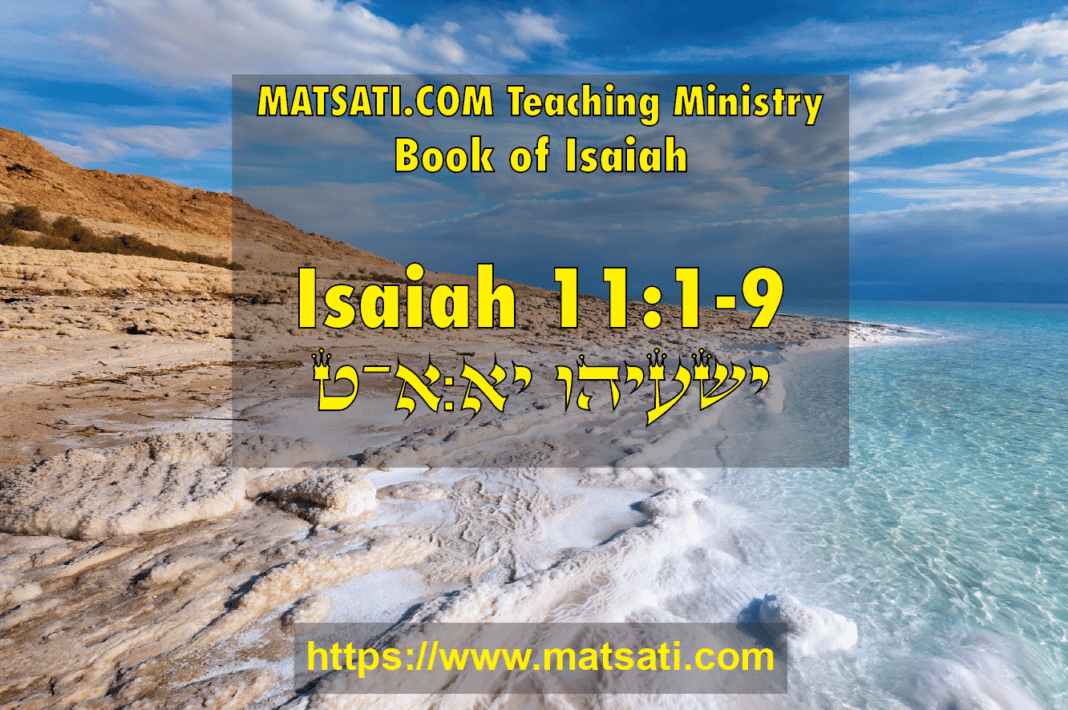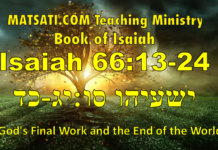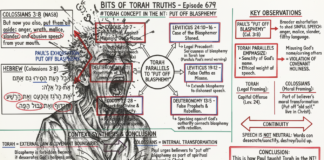Table of Contents
Introduction to Isaiah 11:1-9
Here in Isaiah chapter 11, two verses are quoted in the NT text, Isaiah 11:2 in 1 Peter 4:14, and Isaiah 11:10 in Romans 15:12. According to Isaiah 11, we read the Messianic Expectation that was given us in Isaiah 7:14 where the King Messiah is ruling and offers peace, and life to a dead country, and victory over the oppressive empires that are coming against Judah and Jerusalem (i.e., Assyria, Babylon, etc.). We note the continued theme of Israel’s lack of trust in the Lord, and that following Assyria’s destruction, the remnant of Israel will return to the ways of the Lord God Almighty and to the Land. Isaiah 11 is specifically related to the Messianic Expectation of God sending His Messiah to save the people. Here Isaiah emphasizes three things about the Messianic figure (I) His divine appointment as ruler (Isaiah 11:1-3), (ii) that he will rule in righteousness and justice (Isaiah 11:3-5), and (iii) the provisions of safety for His people as a result of His ruling over them (Isaiah 11:6-9). We note that this Messiah ruler will not consider himself privileged from pride. The anointed one of God will have a sense of responsibility for God’s people to lead them on the ways of God in righteousness, holiness, and truth. This divinely appointed king will not be just any ordinary king, but his coming and rule will be linked to the return of Israel. (Isaiah 11:10-16) This king is the chosen one of God who literally brings with Him the blessing of our Father who is in heaven.
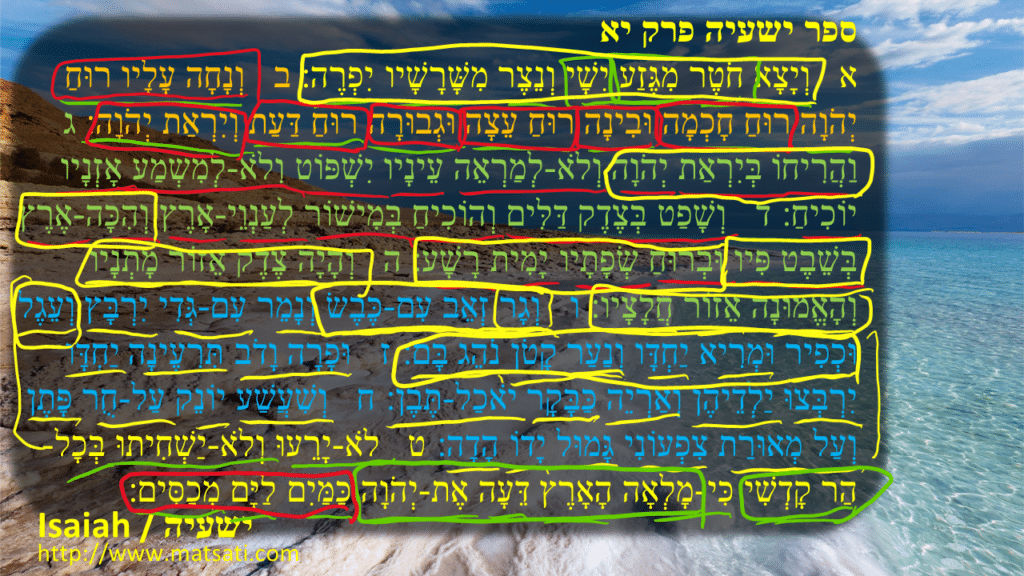
ספר ישעיה פרק יא
א וְיָצָא חֹטֶר מִגֶּזַע יִשָׁי וְנֵצֶר מִשָּׁרָשָׁיו יִפְרֶה:
Isaiah 11:1 states, “And there shall come forth a rod out of the stem of Jesse, (וְיָצָא חֹטֶר מִגֶּזַע יִשָׁי) and a Branch shall grow out of his roots: (וְנֵצֶר מִשָּׁרָשָׁיו יִפְרֶה)” Here Isaiah is speaking of the smallest and newest growth of a plant, the חֹטֶר מִגֶּזַע is the shoot that comes out of the stump. This reminds of what happens when a tree is topped (cut off) from the stump at the top grows many smaller branches. This is the idea here, that Judah has become almost dead, the proverbial stump, and a branch shall proceed from that stump which will lead to the destruction of Assyria. It is important to point out that here Judah and Jerusalem are being cut down. But because of the blessing and miracle of God, life will once again proceed from destruction. On the other hand, Assyria was destroyed in 609 B.C. by Babylon, Media, and Persia, and nothing ever arose from the Assyrian stump because they did not have a covenant with God in heaven. Here we read prophetically through Isaiah, that the Lord will miraculously raise up Judah and Jerusalem, the restoration of the nation. Jesse (יִשָׁי) is a reference to Judah, and most likely to the covenant of David. The point is that the majesty of David’s kingdom would not be what brings back the nation, but the promises of God will do this, as the restoration of the nation is a gift of God through His mercy and grace, it is an act of faithfulness on behalf of God to His people. These things remind us of the words of Jeremiah and Zechariah.
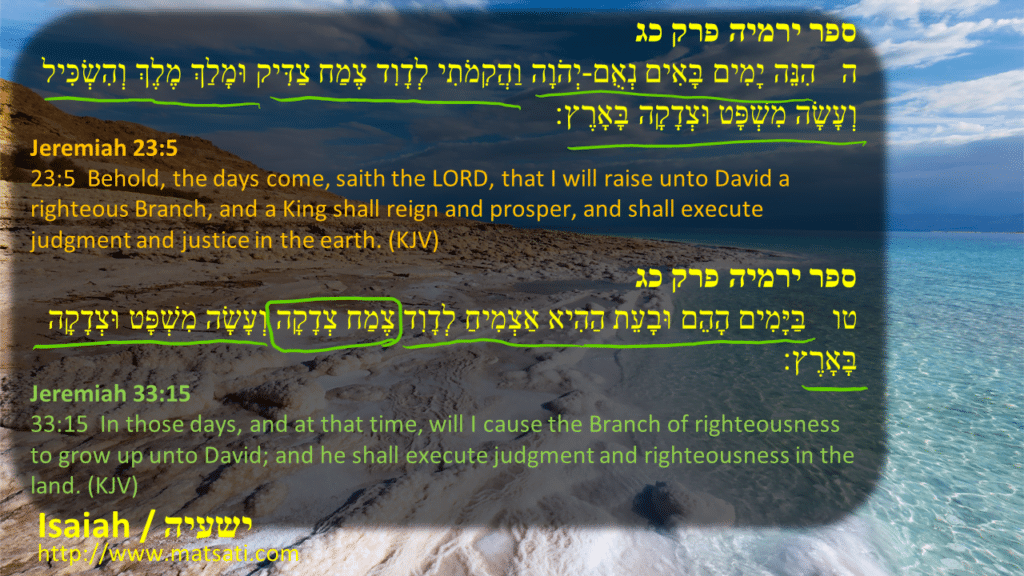
ספר ירמיה פרק כג
ה הִנֵּה יָמִים בָּאִים נְאֻם-יְהֹוָה וַהֲקִמֹתִי לְדָוִד צֶמַח צַדִּיק וּמָלַךְ מֶלֶךְ וְהִשְֹכִּיל וְעָשָֹה מִשְׁפָּט וּצְדָקָה בָּאָרֶץ:
Jeremiah 23:5
23:5 Behold, the days come, saith the LORD, that I will raise unto David a righteous Branch, and a King shall reign and prosper, and shall execute judgment and justice in the earth. (KJV)
ספר ירמיה פרק כג
טו בַּיָּמִים הָהֵם וּבָעֵת הַהִיא אַצְמִיחַ לְדָוִד צֶמַח צְדָקָה וְעָשָֹה מִשְׁפָּט וּצְדָקָה בָּאָרֶץ:
Jeremiah 33:15
33:15 In those days, and at that time, will I cause the Branch of righteousness to grow up unto David; and he shall execute judgment and righteousness in the land. (KJV)
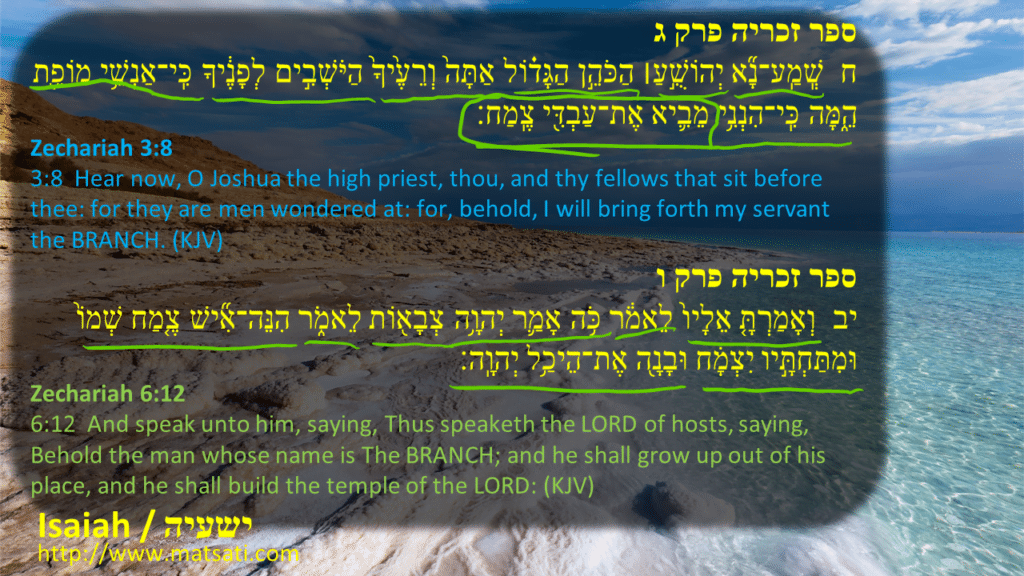
ספר זכריה פרק ג
ח שְֽׁמַֽע־נָ֞א יְהוֹשֻׁ֣עַ׀ הַכֹּהֵ֣ן הַגָּד֗וֹל אַתָּה֙ וְרֵעֶ֙יךָ֙ הַיֹּשְׁבִ֣ים לְפָנֶ֔יךָ כִּֽי־אַנְשֵׁ֥י מוֹפֵ֖ת הֵ֑מָּה כִּֽי־הִנְנִ֥י מֵבִ֛יא אֶת־עַבְדִּ֖י צֶֽמַח׃
Zechariah 3:8
3:8 Hear now, O Joshua the high priest, thou, and thy fellows that sit before thee: for they are men wondered at: for, behold, I will bring forth my servant the BRANCH. (KJV)
ספר זכריה פרק ו
יב וְאָמַרְתָּ֤ אֵלָיו֙ לֵאמֹ֔ר כֹּ֥ה אָמַ֛ר יְהוָ֥ה צְבָא֖וֹת לֵאמֹ֑ר הִנֵּה־אִ֞ישׁ צֶ֤מַח שְׁמוֹ֙ וּמִתַּחְתָּ֣יו יִצְמָ֔ח וּבָנָ֖ה אֶת־הֵיכַ֥ל יְהוָֽה׃
Zechariah 6:12
6:12 And speak unto him, saying, Thus speaketh the LORD of hosts, saying, Behold the man whose name is The BRANCH; and he shall grow up out of his place, and he shall build the temple of the LORD: (KJV)
This idea of a branch provides the expectation of a messianic figure who will rule. This becomes clear according to Jeremiah, that the one who will come will be from the tribe of Jesse, a descendent of David in fulfillment of the promises of God! Isaiah continues saying the following according to Isaiah 11:2.
ספר ישעיה פרק יא
ב וְנָחָה עָלָיו רוּחַ יְהֹוָה רוּחַ חָכְמָה וּבִינָה רוּחַ עֵצָה וּגְבוּרָה רוּחַ דַּעַת וְיִרְאַת יְהֹוָה:
Isaiah 11:2 states, “And the spirit of the LORD shall rest upon him, the spirit of wisdom and understanding, (וְנָחָה עָלָיו רוּחַ יְהֹוָה רוּחַ חָכְמָה וּבִינָה) the spirit of counsel and might, the spirit of knowledge and of the fear of the LORD; (רוּחַ עֵצָה וּגְבוּרָה רוּחַ דַּעַת וְיִרְאַת יְהֹוָה)” Here the Spirit of God consists of the Spirit of wisdom, understanding, counsel, might, knowledge, and fear of the Lord. This reminds us of the seven Spirits of God. The seven Spirits of God (τα επτα πνευματα του θεου, ta hepta pneumata tou theou) are mentioned four times in the Book of Revelation (Revelation 1:4, 3:1, 4:5, 5:6), and in the Book of Isaiah it names each Spirit according to Isaiah 11:2. We also read that Peter references Isaiah 11:2 in his epistle according to 1 Peter 4:14.
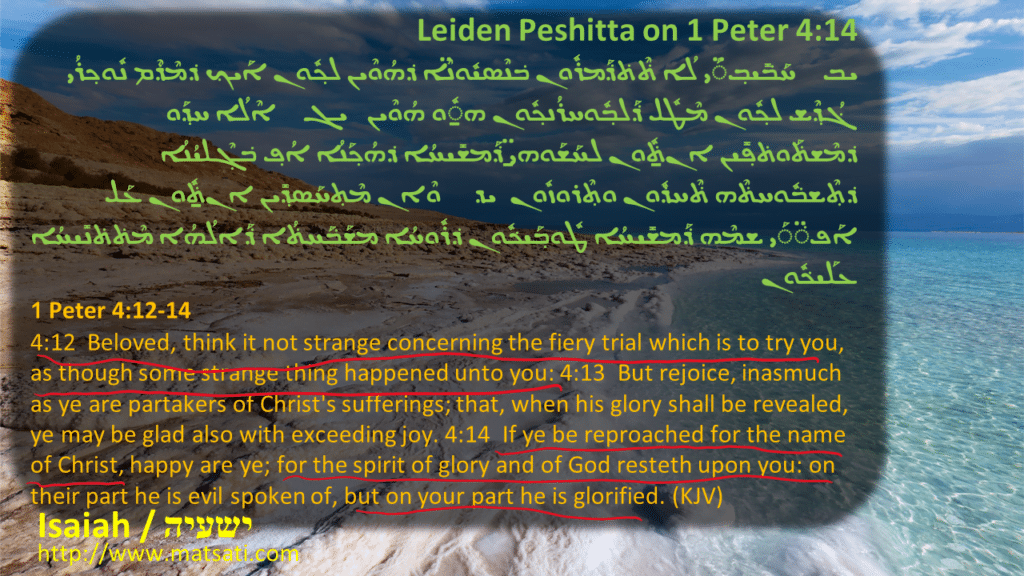
Leiden Peshitta on 1 Peter 4:14
ܝܒ ܚܰܒ݁ܺܝܒ݂̈ܰܝ ܠܳܐ ܬ݁ܶܬ݁ܕ݁ܰܡܪܽܘܢ ܒ݁ܢܶܣܝܽܘ̈ܢܶܐ ܕ݁ܗܳܘܶܝܢ ܠܟ݂ܽܘܢ ܐܰܝܟ݂ ܕ݁ܡܶܕ݁ܶܡ ܢܽܘܟ݂ܪܳܝ ܓ݁ܳܕ݂ܶܫ ܠܟ݂ܽܘܢ ܡܶܛܽܠ ܕ݁ܰܠܒ݂ܽܘܚܪܳܢܟ݂ܽܘܢ ܗ̱ܽܘ ܗܳܘܶܝܢ ܝܓ ܐܶܠܳܐ ܚܕ݂ܰܘ ܕ݁ܡܶܫܬ݁ܰܘܬ݁ܦ݂ܺܝܢ ܐܢ̱ܬ݁ܽܘܢ ܠܚܰܫܰܘܗ̱̈ܝ ܕ݁ܰܡܫܺܝܚܳܐ ܕ݁ܗܳܟ݂ܰܢܳܐ ܐܳܦ݂ ܒ݁ܓ݂ܶܠܝܳܢܳܐ ܕ݁ܬ݂ܶܫܒ݁ܽܘܚܬ݁ܶܗ ܬ݁ܶܚܕ݁ܽܘܢ ܘܬ݂ܶܪܘܙܽܘܢ ܝܕ ܘܶܐܢ ܡܶܬ݂ܚܰܣܕ݂ܺܝܢ ܐܢ̱ܬ݁ܽܘܢ ܥܰܠ ܐܰܦ̈݁ܰܝ ܫܡܶܗ ܕ݁ܰܡܫܺܝܚܳܐ ܛܽܘܒ݂ܰܝܟ݁ܽܘܢ ܕ݁ܪܽܘܚܳܐ ܡܫܰܒ݁ܰܚܬ݁ܳܐ ܕ݁ܰܐܠܳܗܳܐ ܡܶܬ݁ܬ݁ܢܺܝܚܳܐ ܥܠܰܝܟ݁ܽܘܢ
1 peter 4:12-14
4:12 Beloved, think it not strange concerning the fiery trial which is to try you, as though some strange thing happened unto you: 4:13 But rejoice, inasmuch as ye are partakers of Christ’s sufferings; that, when his glory shall be revealed, ye may be glad also with exceeding joy. 4:14 If ye be reproached for the name of Christ, happy are ye; for the spirit of glory and of God resteth upon you: on their part he is evil spoken of, but on your part he is glorified. (KJV)
We note reading the context that Peter states that suffering should not be by reason of sin, but for the sake of righteousness! The reference to this verse is to the Spirit of God resting upon His people. The examples of this from the Tanakh, are according to the Torah, according to Bamidbar / Numbers 11:25, God took some of the Spirit who was on Moses and placed the Spirit on the seventy elders. As the Spirit rested on them, they prophesied. We also read about Bezalel in Shemot / Exodus 31:3 that his craftsmanship was due to the Spirit of God upon him. We read in Judges 14:6 of the spirit resetting upon Samson. We read also that Saul and David also received the Spirit of the Lord (1 Samuel 10:10 and 16:13). Note that this phrase was also considered the divine influence to live a righteous and blessed life (Isaiah 32:14-15, 44:3, Ezekiel 36:25-27). We note that with Isaiah 11:2 juxtaposed to 11:1, the expected coming of the righteous one will be so in the power of God by His presence and His Spirit resting upon him. This describes the divine empowerment of leadership and the calling upon the life of the leader who will guide God’s people into all holiness and righteousness and truth. This is why the Messiah must be empowered by God to do these things, such that He would be successful to complete the work and task that is set before him. The point of the Messianic figure will be to direct the people to be faithful to God in heaven. The point is that the Messiah will guide us into the correct motivation and accountability before God. It is by our faith in the Messiah, and the indwelling of the Holy Spirit of God, that enables us to be fully conscious of our relationship with God and with men, and to know what is expected of us. From Isaiah’s perspective, we will trust in the Lord, act with integrity and justice, and not be self-serving but respectful to others so as not to oppress the weak and not live our lives in pride. This is the power in which the Promised One comes, the Messiah, to bear testimony of God and to save those who would place their faith and trust in Him, and in God our Father in heaven. Isaiah continues saying the following:
ספר ישעיה פרק יא
ג וַהֲרִיחוֹ בְּיִרְאַת יְהֹוָה וְלֹא-לְמַרְאֵה עֵינָיו יִשְׁפּוֹט וְלֹא-לְמִשְׁמַע אָזְנָיו יוֹכִיחַ: ד וְשָׁפַט בְּצֶדֶק דַּלִּים וְהוֹכִיחַ בְּמִישׁוֹר לְעַנְוֵי-אָרֶץ וְהִכָּה-אֶרֶץ בְּשֵׁבֶט פִּיו וּבְרוּחַ שְֹפָתָיו יָמִית רָשָׁע: ה וְהָיָה צֶדֶק אֵזוֹר מָתְנָיו וְהָאֱמוּנָה אֵזוֹר חֲלָצָיו:
Isaiah 11:3 states, “And shall make him of quick understanding in the fear of the LORD: (וַהֲרִיחוֹ בְּיִרְאַת יְהֹוָה) and he shall not judge after the sight of his eyes, (וְלֹא-לְמַרְאֵה עֵינָיו יִשְׁפּוֹט) neither reprove after the hearing of his ears: (וְלֹא-לְמִשְׁמַע אָזְנָיו יוֹכִיחַ)” Isaiah 11:4 “But with righteousness shall he judge the poor, and reprove with equity for the meek of the earth: (וְשָׁפַט בְּצֶדֶק דַּלִּים וְהוֹכִיחַ בְּמִישׁוֹר לְעַנְוֵי-אָרֶץ) and he shall smite the earth: with the rod of his mouth, and with the breath of his lips shall he slay the wicked. (וְהִכָּה-אֶרֶץ בְּשֵׁבֶט פִּיו וּבְרוּחַ שְֹפָתָיו יָמִית רָשָׁע)” Isaiah 11:5 “And righteousness shall be the girdle of his loins, (וְהָיָה צֶדֶק אֵזוֹר מָתְנָיו) and faithfulness the girdle of his reins. (וְהָאֱמוּנָה אֵזוֹר חֲלָצָיו)” This reminds us of Yeshua doesn’t it, what Isaiah states according to 11:3 that he will not judge after the sight of his eyes. (וְלֹא-לְמַרְאֵה עֵינָיו יִשְׁפּוֹט)
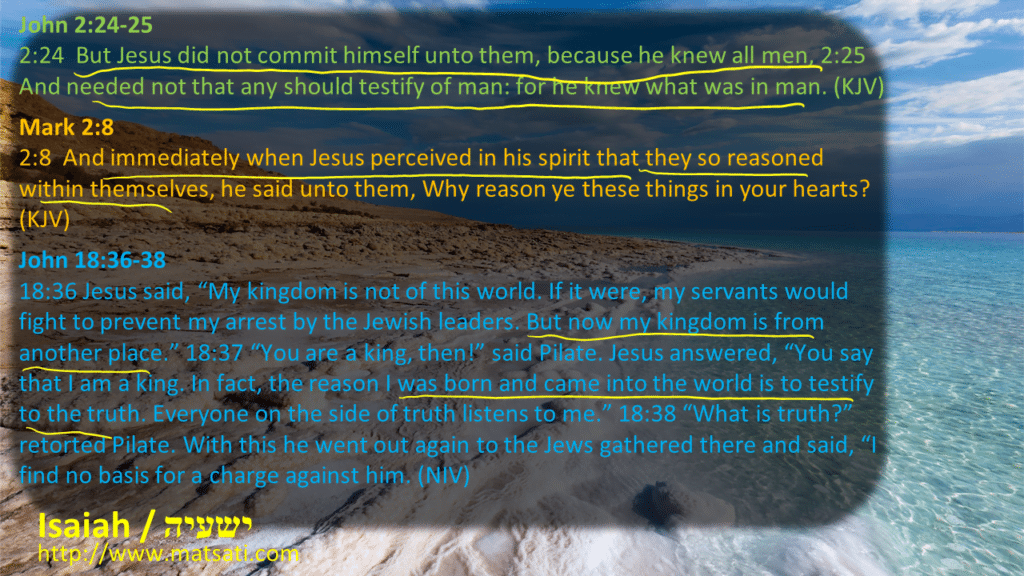
John 2:24-25
2:24 But Jesus did not commit himself unto them, because he knew all men, 2:25 And needed not that any should testify of man: for he knew what was in man. (KJV)
Mark 2:8
2:8 And immediately when Jesus perceived in his spirit that they so reasoned within themselves, he said unto them, Why reason ye these things in your hearts? (KJV)
These things suggest that the Messiah will have special insight given by God. This earmarks the way in which the Messiah will rule, that he will not be looking to external appearances, but will know what is on the inside of a man and will rule in righteousness and truth. Isaiah 11:3 opens saying וַהֲרִיח֖וֹ בְּיִרְאַ֣ת יְהוָ֑ה where the word וַהֲרִיח֖וֹ is written in the hifil infinitive suggesting that the messiah will be able to “smell the fear of the Lord.” This is a strange way of describing he will know or have understanding of one’s intention supernaturally. This is consistent with what Yeshua said according to John 18:36-38.
John 18:36-38
18:36 Jesus said, “My kingdom is not of this world. If it were, my servants would fight to prevent my arrest by the Jewish leaders. But now my kingdom is from another place.” 18:37 “You are a king, then!” said Pilate. Jesus answered, “You say that I am a king. In fact, the reason I was born and came into the world is to testify to the truth. Everyone on the side of truth listens to me.” 18:38 “What is truth?” retorted Pilate. With this he went out again to the Jews gathered there and said, “I find no basis for a charge against him. (NIV)
Yeshua speaking to Pilate confessed that His kingdom was not of this world, and of supernatural origin, to even sending legions of angels to his help, all he had to do was ask. The phrase וְהִכָּה-אֶרֶץ בְּשֵׁבֶט פִּיו וּבְרוּחַ שְֹפָתָיו יָמִית רָשָׁע “and he shall smite the earth: with the rod of his mouth, and with the breath of his lips shall he slay the wicked” reveals the power of His words having equal weightiness as God’s. This is consistent with what we read in the NT text, such as in 2 Thessalonians 2:8, Hebrews 4:12-14, Revelation 1:16,19:15). These scriptures indicate that the Messiah will judge in righteousness the poor and the meek, and that he will judge the earth (Isaiah 11:4), he will be girded in faithfulness and righteousness (Isaiah 11:5). These descriptions sound a lot like Paul’s exhortation in Ephesians 6:14-15. Righteousness and faithfulness are two qualities of God that are central to the scripture and our lives. These are the characteristics that are promised of God of the One who He would send to bring deliverance to His people. Isaiah goes on saying the following:
ספר ישעיה פרק יא
ו וְגָר זְאֵב עִם-כֶּבֶשֹ וְנָמֵר עִם-גְּדִי יִרְבָּץ וְעֵגֶל וּכְפִיר וּמְרִיא יַחְדָּו וְנַעַר קָטֹן נֹהֵג בָּם: ז וּפָרָה וָדֹב תִּרְעֶינָה יַחְדָּו יִרְבְּצוּ יַלְדֵיהֶן וְאַרְיֵה כַּבָּקָר יֹאכַל-תֶּבֶן: ח וְשִׁעֲשַׁע יוֹנֵק עַל-חֻר פָּתֶן וְעַל מְאוּרַת צִפְעוֹנִי גָּמוּל יָדוֹ הָדָה:
Isaiah 11:6 states, “The wolf also shall dwell with the lamb, (וְגָר זְאֵב עִם-כֶּבֶשֹ) and the leopard shall lie down with the kid; (וְנָמֵר עִם-גְּדִי יִרְבָּץ) and the calf and the young lion and the fatling together; and a little child shall lead them. (וְעֵגֶל וּכְפִיר וּמְרִיא יַחְדָּו וְנַעַר קָטֹן נֹהֵג בָּם)” Isaiah 11:7 “And the cow and the bear shall feed; their young ones shall lie down together: (וּפָרָה וָדֹב תִּרְעֶינָה יַחְדָּו יִרְבְּצוּ יַלְדֵיהֶן) and the lion shall eat straw like the ox. (וְאַרְיֵה כַּבָּקָר יֹאכַל-תֶּבֶן)” Isaiah 11:8 “And the sucking child shall play on the hole of the asp, (וְשִׁעֲשַׁע יוֹנֵק עַל-חֻר פָּתֶן) and the weaned child shall put his hand on the cockatrice’ den. (וְעַל מְאוּרַת צִפְעוֹנִי גָּמוּל יָדוֹ הָדָה)” Here, these verses are grouped together because they foretell of a future time when there will be peace, safety, and security, as result of the Messianic kingdom. This idea of וְגָר זְאֵב עִם-כֶּבֶשֹ “the wolf will sojourn with the lamb” with the small child leading (וְנַעַר קָטֹן נֹהֵג) the lion and the calf together (וְעֵגֶל וּכְפִיר וּמְרִיא יַחְדָּו), and how the cow and the bear feeding together (וּפָרָה וָדֹב תִּרְעֶינָה יַחְדָּו) and the child playing on the hole of an asp (וְשִׁעֲשַׁע יוֹנֵק עַל-חֻר פָּתֶן), these things describe the messianic age when the Messiah comes. The helpless and innocent will be at peace and violence will cease from the animal kingdom as there will be peace throughout the Earth. The question about these verses is whether these are literal or figurative? A literal interpretation means that these events have not happened yet, and the Messiah has not come. The Figurative approach means that these things describe a time of peace that is purely associated with evil being removed under the rule and reign of the Messianic king. These things remind us of Romans 8:19-21
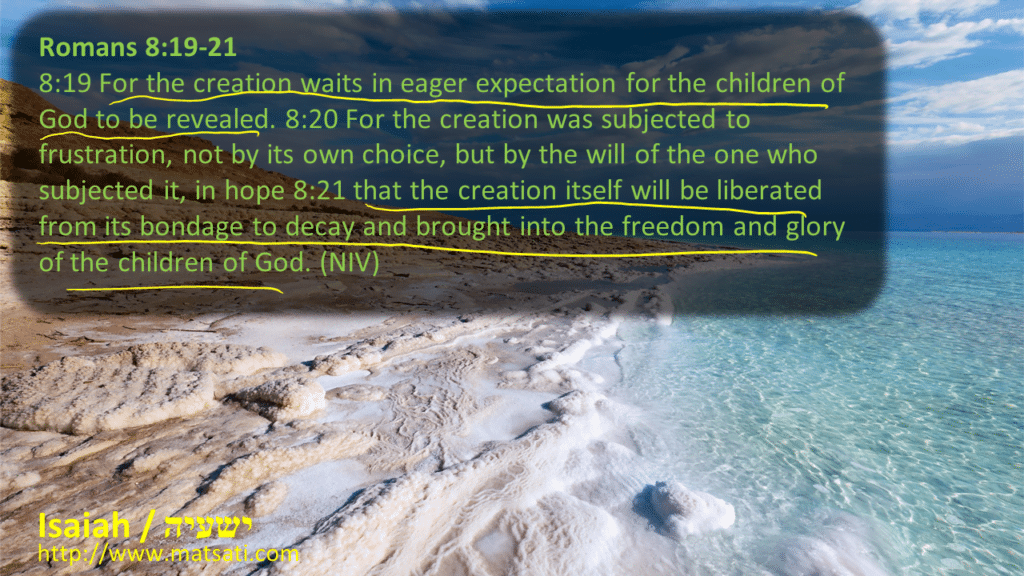
Romans 8:19-21
8:19 For the creation waits in eager expectation for the children of God to be revealed. 8:20 For the creation was subjected to frustration, not by its own choice, but by the will of the one who subjected it, in hope 8:21 that the creation itself will be liberated from its bondage to decay and brought into the freedom and glory of the children of God. (NIV)
Here Paul proposes the idea of a future expectation of redemption, not just for the individual, but for all of creation itself to be set free from the bondage to death and decay. The idea is that at this future time, the world also will be brought into the freedom and glory that God gives to His children. We note the child leading the peaceful beast and the carnivore, providing us with a child theme, similar to that which we have read in previous chapters (Isaiah 7-9), where the child is the one chosen by God to rule and bring peace. Isaiah 11:8, וְשִׁעֲשַׁע יוֹנֵק עַל-חֻר פָּתֶן וְעַל מְאוּרַת צִפְעוֹנִי גָּמוּל יָדוֹ הָדָה “And the sucking child shall play on the hole of the asp, and the weaned child shall put his hand on the cockatrice’ den,” speaks to the idea of sudden death. The poisonous snake or asp is symbolic of the snake that strikes, and the end result is death, especially for a small child. What Isaiah is communicating here is that in the day of the Messiah, under his rule and reign, that death itself will be conquered. (1 Corinthians 15:50-58)
ספר ישעיה פרק יא
ט לֹא-יָרֵעוּ וְלֹא-יַשְׁחִיתוּ בְּכָל-הַר קָדְשִׁי כִּי-מָלְאָה הָאָרֶץ דֵּעָה אֶת-יְהֹוָה כַּמַּיִם לַיָּם מְכַסִּים:
Isaiah 11:9 states, “They shall not hurt nor destroy in all my holy mountain: (לֹא-יָרֵעוּ וְלֹא-יַשְׁחִיתוּ בְּכָל-הַר קָדְשִׁי) for the earth shall be full of the knowledge of the LORD, as the waters cover the sea. (כִּי-מָלְאָה הָאָרֶץ דֵּעָה אֶת-יְהֹוָה כַּמַּיִם לַיָּם מְכַסִּים)” The idea here is that there will be no killing upon the holy mountain of the Lord. The “mountain of the Lord” or “my holy mountain” or “the mountain of the Lord’s temple” or “The Holy Mountain.” These expressions often mean the place in Jerusalem where the temple was located. Sometimes it means Zion or the place where God is present with his people. The question is “Who Can Ascend the Holy Hill of God?” We note that those who may ascend are only those who have been sanctified by God. The author of Tehillim / Psalms 15 begins by asking the question 15:1 Lord, who shall abide in thy tabernacle? who shall dwell in thy holy hill? (KJV) These things remind us of the requirement to be holy in order to ascend Mount Sinai in the days of Moshe and the Wilderness. Consistent with this, Tehillim / Psalms 15 goes on to say the following.
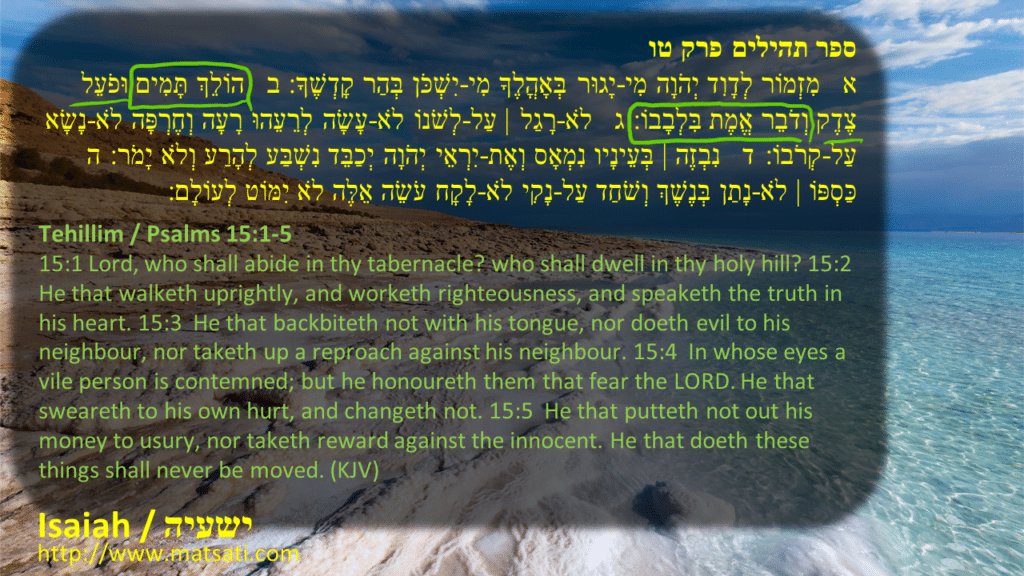
ספר תהילים פרק טו
א מִזְמוֹר לְדָוִד יְהֹוָה מִי-יָגוּר בְּאָהֳלֶךָ מִי-יִשְׁכֹּן בְּהַר קָדְשֶׁךָ: ב הוֹלֵךְ תָּמִים וּפֹעֵל צֶדֶק וְדֹבֵר אֱמֶת בִּלְבָבוֹ: ג לֹא-רָגַל | עַל-לְשֹׁנוֹ לֹא-עָשָֹה לְרֵעֵהוּ רָעָה וְחֶרְפָּה לֹא-נָשָֹא עַל-קְרֹבוֹ: ד נִבְזֶה | בְּעֵינָיו נִמְאָס וְאֶת-יִרְאֵי יְהֹוָה יְכַבֵּד נִשְׁבַּע לְהָרַע וְלֹא יָמֹר: ה כַּסְפּוֹ | לֹא-נָתַן בְּנֶשֶׁךְ וְשֹׁחַד עַל-נָקִי לֹא-לָקָח עֹשֵֹה אֵלֶּה לֹא יִמּוֹט לְעוֹלָם:
Tehillim / Psalms 15:1-5
15:1 Lord, who shall abide in thy tabernacle? who shall dwell in thy holy hill? 15:2 He that walketh uprightly, and worketh righteousness, and speaketh the truth in his heart. 15:3 He that backbiteth not with his tongue, nor doeth evil to his neighbour, nor taketh up a reproach against his neighbour. 15:4 In whose eyes a vile person is contemned; but he honoureth them that fear the LORD. He that sweareth to his own hurt, and changeth not. 15:5 He that putteth not out his money to usury, nor taketh reward against the innocent. He that doeth these things shall never be moved. (KJV)
There are very similar concepts in Tehillim / Psalms 24 which state the following:
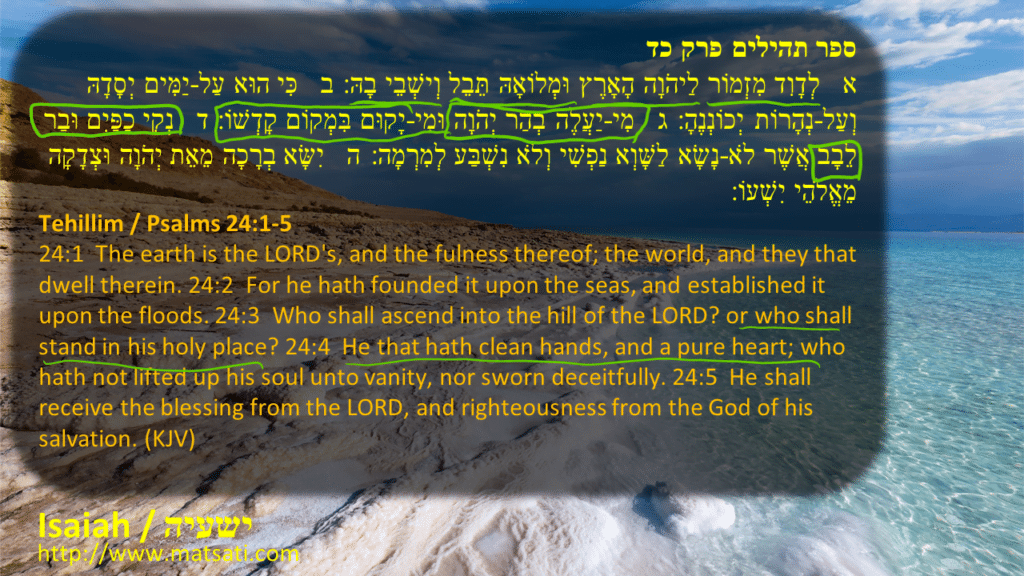
ספר תהילים פרק כד
א לְדָוִד מִזְמוֹר לַיהֹוָה הָאָרֶץ וּמְלוֹאָהּ תֵּבֵל וְישְׁבֵי בָהּ: ב כִּי הוּא עַל-יַמִּים יְסָדָהּ וְעַל-נְהָרוֹת יְכוֹנְנֶהָ: ג מִי-יַעֲלֶה בְהַר יְהֹוָה וּמִי-יָקוּם בִּמְקוֹם קָדְשׁוֹ: ד נְקִי כַפַּיִם וּבַר לֵבָב אֲשֶׁר לֹא-נָשָֹא לַשָּׁוְא נַפְשִׁי וְלֹא נִשְׁבַּע לְמִרְמָה: ה יִשָּׂא בְרָכָה מֵאֵת יְהֹוָה וּצְדָקָה מֵאֱלֹהֵי יִשְׁעוֹ:
Tehillim / Psalms 24:1-5
24:1 The earth is the LORD’s, and the fulness thereof; the world, and they that dwell therein. 24:2 For he hath founded it upon the seas, and established it upon the floods. 24:3 Who shall ascend into the hill of the LORD? or who shall stand in his holy place? 24:4 He that hath clean hands, and a pure heart; who hath not lifted up his soul unto vanity, nor sworn deceitfully. 24:5 He shall receive the blessing from the LORD, and righteousness from the God of his salvation. (KJV)
Here the one who may ascend the holy mountain / hill is one who has clean hands and a pure heart. (Tehillim / Psalms 24:3) The mention of “clean hands and a pure heart” highlights the importance of moral holiness and righteousness. This is the tell-tale-sign of those who are God’s holy and treasured people. This verse according to Isaiah 11:9 may lead to the interpretation of the reasons why there is no death on the mountain of God, because this place is inhabited by His holy people! We note how submission of our lives to the Lord, and the peace that the Messiah brings by the indwelling of God’s Holy Spirit, these things produce an environment where men will have care and concern from one another. This peace will extend worldwide, there will be safety and worry will be removed because of knowledge and understanding of the ways of God. The emphasis here is upon the Lord working in the lives of His people, and the examples given, of God’s power to work in the animal kingdom as well, is significant. The animals who instinctively kill and destroy, like the lion and the bear, the Lord God will change the animal behavior to that of peace, righteousness, and holiness. Note this draws a parallel to the three levels of spirituality, basar → nefesh → neshamah. Here the Lord God is supernaturally transforming those who live in the flesh (basar) to those who live according to the spirit (neshamah) being able to hear the word of the Lord God in heaven (prophecy) and apply the Torah and all of Scripture to their lives for the glory of God! It is interesting the Messianic parallels that we find in the NT text, as the Messiah Yeshua bringing all of these things through the power of our Father in heaven via the indwelling of the Holy Spirit.
Rabbinic Literature on Isaiah 11:1-9
The Targum Jonathan is a rabbinic interpretation of the book of Isaiah. Let’s have a look at the Targum translation and the rabbinic literature to see what the rabbis have to say concerning these verses.
תרגום יונתן בן עוזיאל אל ישעיה פרק יא:א-ט
א וְיִפֹוק מַלכָא מִבְנֹוהִי דְיִשָי וּמשִיחָא מִבְנֵי בְנֹוהִי יִתרַבֵי׃ ב וְתִשרֵי עְלֹוהִי רוּחַ מִן קֳדָם יוי רוּחַ חָכמָה וְסֻכלְתָנוּ רוּחַ מֵילַך וּגבוּרָא רוּחַ מַדַע וְדַחלְתָא דַיוי׃ ג וִיקָרְבִיניֵה לְדַחלְתֵיה יוי וְלָא לְחֵיזוּ עֵינֹוהִי יְהֵי דָאֵין וְלָא לְמִשמַע אוּדנֹוהִי יְהֵי מֹוכַח׃ ד וִידִין בְקוּשטָא מִסכֵינִין וְיֹוכַח בְהֵימָנוּתָא לְחַשִיכֵי עַמָא דארעא וְיִמחֵי חַייָבֵי אַרעָא בְמֵימַר פוּמֵיה וּבמַמלַל סִפוָתֵיה יְהֵי מָאִית רַשִיעָא׃ ה וִיהֹון צַדִיקַיָא סְחֹור סְחֹור לֵיה וְעָבְדֵי הֵימָנוּתָא מְקָרְבִין לֵיה׃ ו בְיֹומֹוהִי דִמשִיחָא דְיִשׂרָאֵל יִסגֵי שְלָמָא בְאַרעָא וִידוּר דֵיבָא עִם אִימְרָא וְנִמרָא עִם גַדיָא יִשרֵי וְעֵגַל וְאַריָא וּפַטִים כַחדָא וְיָניִק זְעיֵר מְדַבַר לְהֹון׃ ז וְתֹורְתָא וְדוּבָא יִרעְיָן כַחדָא יִשרֹון בְנֵיהֹון וְאַריָא כְתֹורָא יֵיכֹול תִבנָא׃ ח וִיחָיֵיך יָנְקָא עַל חוּר חִיוֵי פְתַן וְעַל חֵיזוּ גִלגְלֵי עֵינֵי חִוֵי חֻרמָן חְסִילָא יְדֹוהִי יֹושִיט׃ ט לָא יַבאְשוּן וְלָא יְחַבְלוּן בְכָל טוּרָא דְקוּדשִי אְרֵי תִתמְלֵי אַרעָא מַדַע יָת דַחלְתָא דַיוי כְמַיָא דִליַמָא חָפַן׃
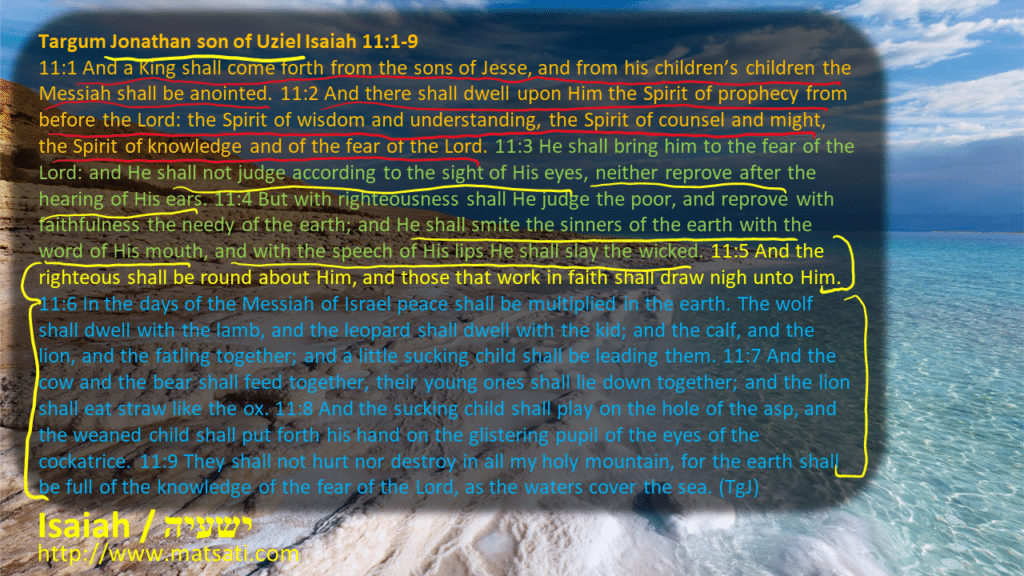
Targum Jonathan son of Uziel Isaiah 11:1-9
11:1 And a King shall come forth from the sons of Jesse, and from his children’s children the Messiah shall be anointed. 11:2 And there shall dwell upon Him the Spirit of prophecy from before the Lord: the Spirit of wisdom and understanding, the Spirit of counsel and might, the Spirit of knowledge and of the fear of the Lord. 11:3 He shall bring him to the fear of the Lord: and He shall not judge according to the sight of His eyes, neither reprove after the hearing of His ears. 11:4 But with righteousness shall He judge the poor, and reprove with faithfulness the needy of the earth; and He shall smite the sinners of the earth with the word of His mouth, and with the speech of His lips He shall slay the wicked. 11:5 And the righteous shall be round about Him, and those that work in faith shall draw nigh unto Him. 11:6 In the days of the Messiah of Israel peace shall be multiplied in the earth. The wolf shall dwell with the lamb, and the leopard shall dwell with the kid; and the calf, and the lion, and the fatling together; and a little sucking child shall be leading them. 11:7 And the cow and the bear shall feed together, their young ones shall lie down together; and the lion shall eat straw like the ox. 11:8 And the sucking child shall play on the hole of the asp, and the weaned child shall put forth his hand on the glistering pupil of the eyes of the cockatrice. 11:9 They shall not hurt nor destroy in all my holy mountain, for the earth shall be full of the knowledge of the fear of the Lord, as the waters cover the sea. (TgJ)
The Targum speaks directly of the King Messiah being the one who comes forth from the sons of Jesse. History bares out this truth where that son was David. Note that David lived prior to Isaiah. א וְיִפֹוק מַלכָא מִבְנֹוהִי דְיִשָי וּמשִיחָא מִבְנֵי בְנֹוהִי יִתרַבֵי׃ 11:1 And a King shall come forth from the sons of Jesse, and from his children’s children the Messiah shall be anointed. (TgJ) These words provide the people at that time a continued Messianic Expectation of the coming Messiah. Also, this excludes Hezekiah from being the Messiah, the one whom Ibn Ezra and others tend to suggest in order to reconcile the child king narrative according to Isaiah 7-9. Remember, the reason the rabbinic literature tends to direct the readers to Hezekiah and others is due to the striking resemblance (parallels) to Yeshua the Messiah. Rashi states the following concerning this verse.
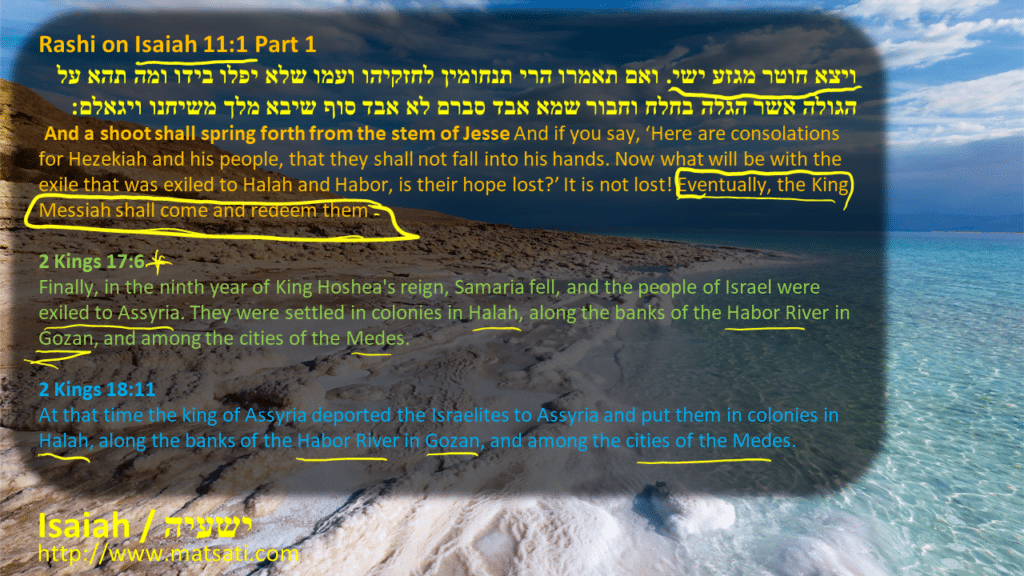
Rashi on Isaiah 11:1 Part 1
ויצא חוטר מגזע ישי. ואם תאמרו הרי תנחומין לחזקיהו ועמו שלא יפלו בידו ומה תהא על הגולה אשר הגלה בחלח וחבור שמא אבד סברם לא אבד סוף שיבא מלך משיחנו ויגאלם:
And a shoot shall spring forth from the stem of Jesse And if you say, ‘Here are consolations for Hezekiah and his people, that they shall not fall into his hands. Now what will be with the exile that was exiled to Halah and Habor, is their hope lost?’ It is not lost! Eventually, the King Messiah shall come and redeem them
Rashi mentions they were exiled to Halah and Habor in connection to this Messinanic King who will come to redeem them. According to the Scriptures, the Assyrians exiled northern Israel to Halah, Habor, Hara, and the Gozan River. The biblical record is found in the following references.
2 Kings 17:6
Finally, in the ninth year of King Hoshea’s reign, Samaria fell, and the people of Israel were exiled to Assyria. They were settled in colonies in Halah, along the banks of the Habor River in Gozan, and among the cities of the Medes.
2 Kings 18:11
At that time the king of Assyria deported the Israelites to Assyria and put them in colonies in Halah, along the banks of the Habor River in Gozan, and among the cities of the Medes.
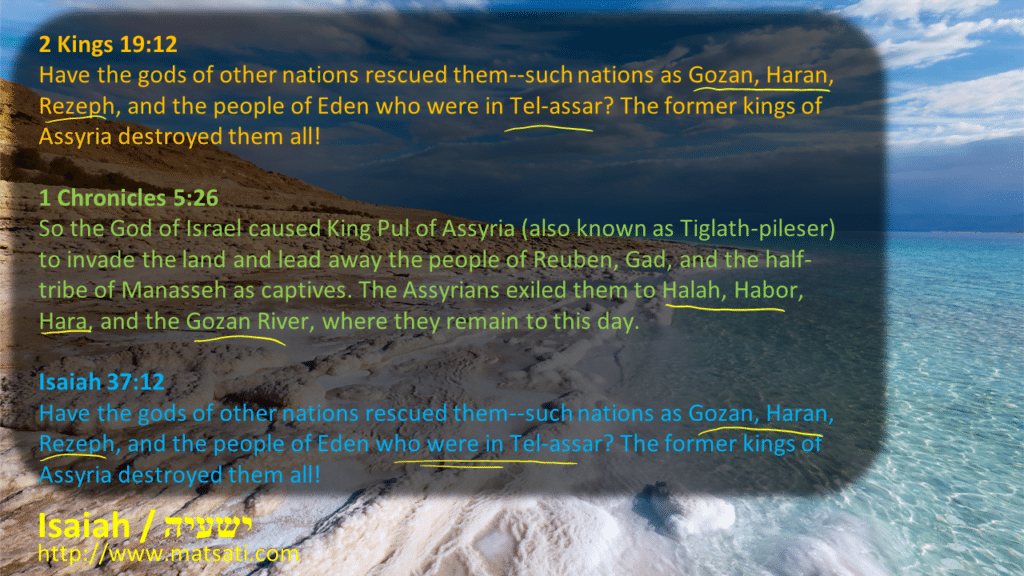
2 Kings 19:12
Have the gods of other nations rescued them–such nations as Gozan, Haran, Rezeph, and the people of Eden who were in Tel-assar? The former kings of Assyria destroyed them all!
1 Chronicles 5:26
So the God of Israel caused King Pul of Assyria (also known as Tiglath-pileser) to invade the land and lead away the people of Reuben, Gad, and the half-tribe of Manasseh as captives. The Assyrians exiled them to Halah, Habor, Hara, and the Gozan River, where they remain to this day.
Isaiah 37:12
Have the gods of other nations rescued them–such nations as Gozan, Haran, Rezeph, and the people of Eden who were in Tel-assar? The former kings of Assyria destroyed them all!
We note again that the Lord God of Israel was the One who caused the nations to come against Israel due to her unrepentant sin. The Lord God did not leave the people without hope. Just as Rashi states, “Eventually, the King Messiah shall come and redeem them.” Midrash Eichah Rabbah Parashat 1 Part 51 states the following concerning these verses.
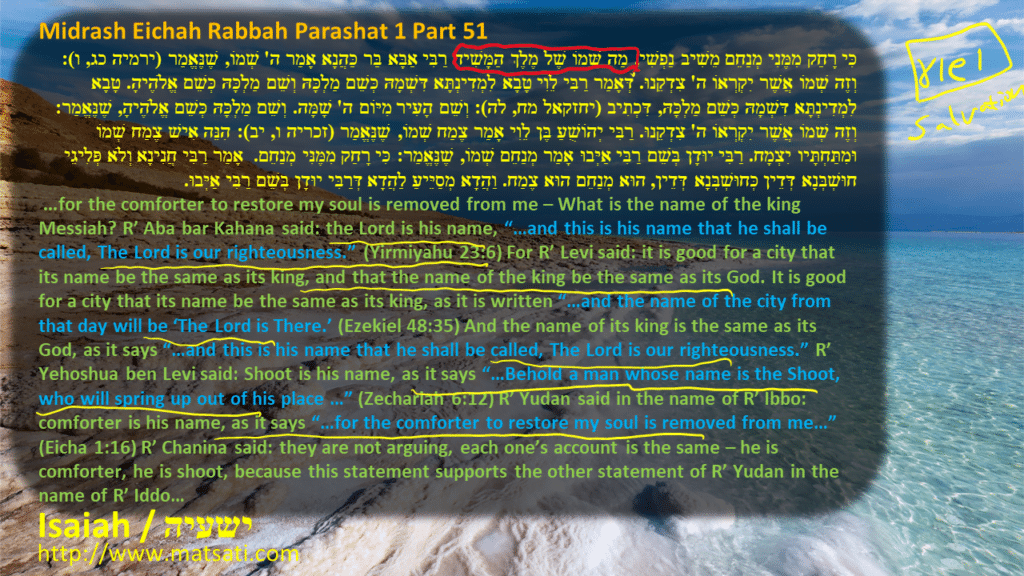
Midrash Eichah Rabbah Parashat 1 Part 51
…
כִּי רָחַק מִמֶּנִי מְנַחֵם מֵשִׁיב נַפְשִׁי, מַה שְּׁמוֹ שֶׁל מֶלֶךְ הַמָּשִׁיחַ רַבִּי אַבָּא בַּר כַּהֲנָא אָמַר ה’ שְׁמוֹ, שֶׁנֶּאֱמַר (ירמיה כג, ו): וְזֶה שְׁמוֹ אֲשֶׁר יִקְרְאוֹ ה’ צִדְקֵנוּ. דְּאָמַר רַבִּי לֵוִי טָבָא לִמְדִינְתָּא דִּשְׁמָהּ כְּשֵׁם מַלְכָּהּ וְשֵׁם מַלְכָּהּ כְּשֵׁם אֱלֹהֶיהָ. טָבָא לִמְדִינְתָּא דִּשְׁמָהּ כְּשֵׁם מַלְכָּהּ, דִּכְתִיב (יחזקאל מח, לה): וְשֵׁם הָעִיר מִיּוֹם ה’ שָׁמָּה. וְשֵׁם מַלְכָּהּ כְּשֵׁם אֱלֹהֶיהָ, שֶׁנֶּאֱמַר: וְזֶה שְׁמוֹ אֲשֶׁר יִקְרְאוֹ ה’ צִדְקֵנוּ. רַבִּי יְהוֹשֻׁעַ בֶּן לֵוִי אָמַר צֶמַח שְׁמוֹ, שֶׁנֶּאֱמַר (זכריה ו, יב): הִנֵּה אִישׁ צֶמַח שְׁמוֹ וּמִתַּחְתָּיו יִצְמָח. רַבִּי יוּדָן בְּשֵׁם רַבִּי אַיְּבוּ אָמַר מְנַחֵם שְׁמוֹ, שֶׁנֶּאֱמַר: כִּי רָחַק מִמֶּנִּי מְנַחֵם. אָמַר רַבִּי חֲנִינָא וְלֹא פְּלִיגֵי חוּשְׁבְּנָא דְּדֵין כְּחוּשְׁבְּנָא דְּדֵין, הוּא מְנַחֵם הוּא צֶמַח. וַהֲדָא מְסַיֵּיעַ לַהֲדָא דְּרַבִּי יוּדָן בְּשֵׁם רַבִּי אַיְּבוּ.
… for the comforter to restore my soul is removed from me – What is the name of the king Messiah? R’ Aba bar Kahana said: the Lord is his name, “…and this is his name that he shall be called, The Lord is our righteousness.” (Yirmiyahu 23:6) For R’ Levi said: it is good for a city that its name be the same as its king, and that the name of the king be the same as its God. It is good for a city that its name be the same as its king, as it is written “…and the name of the city from that day will be ‘The Lord is There.’ (Ezekiel 48:35) And the name of its king is the same as its God, as it says “…and this is his name that he shall be called, The Lord is our righteousness.” R’ Yehoshua ben Levi said: Shoot is his name, as it says “…Behold a man whose name is the Shoot, who will spring up out of his place …” (Zechariah 6:12) R’ Yudan said in the name of R’ Ibbo: comforter is his name, as it says “…for the comforter to restore my soul is removed from me…” (Eicha 1:16) R’ Chanina said: they are not arguing, each one’s account is the same – he is comforter, he is shoot, because this statement supports the other statement of R’ Yudan in the name of R’ Iddo…
The Midrash asks the question מַה שְּׁמוֹ שֶׁל מֶלֶךְ הַמָּשִׁיחַ “What is the name of the king Messiah?” The answer is in connection to Jeremiah 23:6.
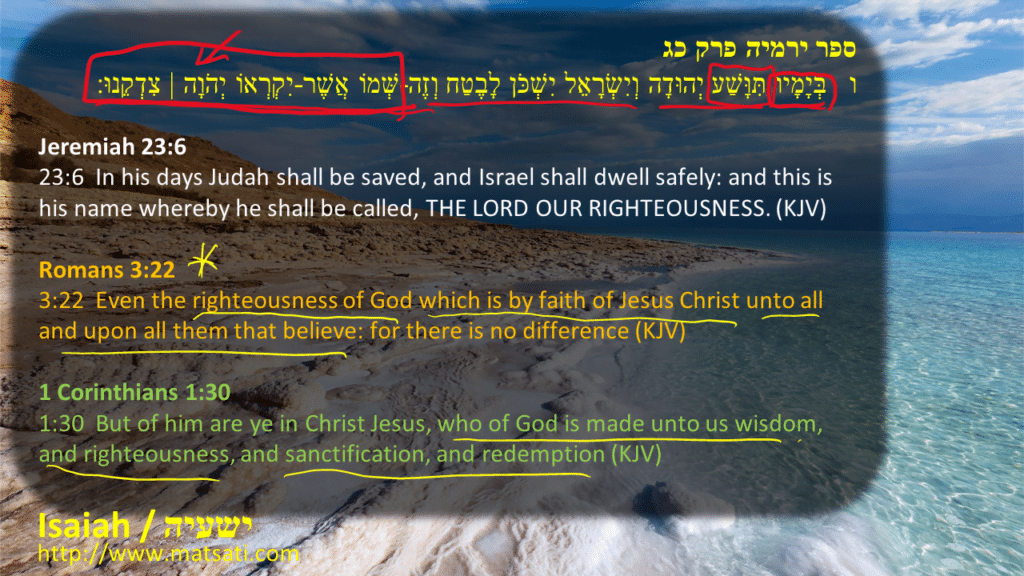
ספר ירמיה פרק כג
ו בְּיָמָיו תִּוָּשַׁע יְהוּדָה וְיִשְֹרָאֵל יִשְׁכֹּן לָבֶטַח וְזֶה-שְּׁמוֹ אֲשֶׁר-יִקְרְאוֹ יְהֹוָה | צִדְקֵנוּ:
Jeremiah 23:6
23:6 In his days Judah shall be saved, and Israel shall dwell safely: and this is his name whereby he shall be called, THE LORD OUR RIGHTEOUSNESS. (KJV)
The rabbinic response to the question is a reference to Jeremiah 23:6 and specifically יְהֹוָה | צִדְקֵנוּ “The Lord our righteousness.” We note the word בְּיָמָיו meaning “in his days” is a reference to the Messianic figure, the One who will come to redeem God’s people, יְהוּדָה וְיִשְֹרָאֵל “that Judah and Israel,” תִּוָּשַׁע (Nif’al imperfect, 3fs) “will be saved.” These shall dwell in security (יִשְׁכֹּן לָבֶטַח) and this is his name where he shall be called (וְזֶה-שְּׁמוֹ אֲשֶׁר-יִקְרְאוֹ), the HaShem our righteousness (יְהֹוָה | צִדְקֵנוּ). The Midrash goes on to discuss the name of the Messiah will be Comforter. This verse from Jeremiah is used by Paul in his epistles according to Romans 3:22, 1 Corinthians 1:30, 2 Corinthians 5:21, and Phillipians 3:9.
Romans 3:22
3:22 Even the righteousness of God which is by faith of Jesus Christ unto all and upon all them that believe: for there is no difference (KJV)
1 Corinthians 1:30
1:30 But of him are ye in Christ Jesus, who of God is made unto us wisdom, and righteousness, and sanctification, and redemption (KJV)
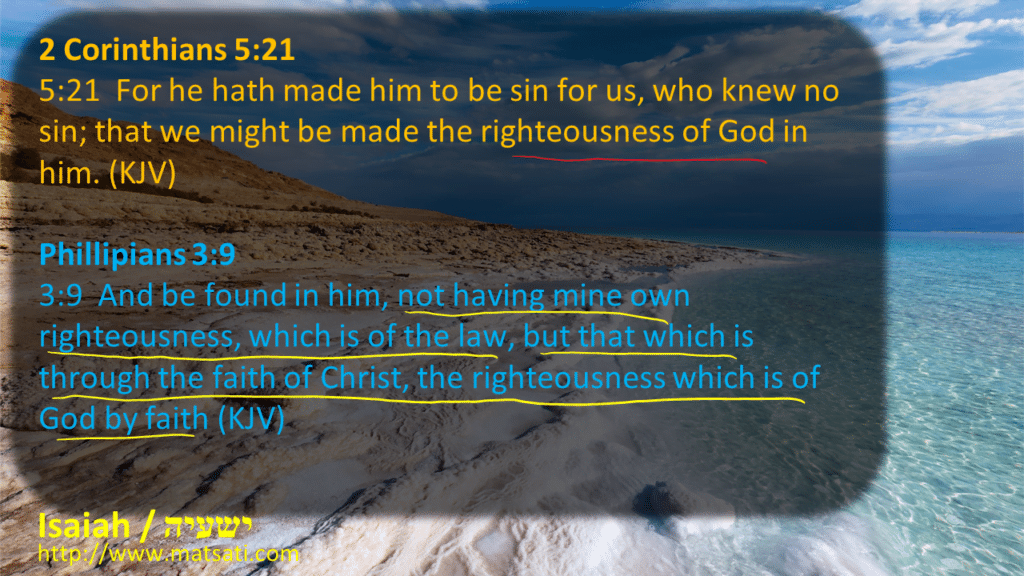
2 Corinthians 5:21
5:21 For he hath made him to be sin for us, who knew no sin; that we might be made the righteousness of God in him. (KJV)
Phillipians 3:9
3:9 And be found in him, not having mine own righteousness, which is of the law, but that which is through the faith of Christ, the righteousness which is of God by faith (KJV)
What we note here is how the NT text is consistent with the Rabbinic reasoning concerning the righteousness that we receive in the Messiah Yeshua. This line of reasoning follows from commentary upon Isaiah 11:1 and Jeremiah 23:6. According to Romans 15:12, Paul connects Yeshua descending from Jesse to the hope of the Gentiles citing Isaiah 11:10 saying, “And again, Isaiah says: ‘There shall be a root of Jesse; and He who shall rise to reign over the Gentiles, in Him the Gentiles shall hope.'” Jesse’s female ancestors include three non Jewish women. The first was Tamar, a Canaanite, the midrashic literature claims was a convert. (see Bereshit / Genesis 38). The second is Rahab (see Joshua 2; Matthew 1:5), and Ruth the Moabitess (Ruth 4:13-22). Because these were Jesse’s relatives, they are also Yeshua’s ancestors. Thus, Paul argues that Yeshua became a servant “that the Gentiles might glorify God for His mercy” (Romans 15:9). The Jewish commentary Shenei Luchot HaBerit, Torah Shebikhtav, Pinchas, Torah Ohr 13 states the following concerning Isaiah 11:1.
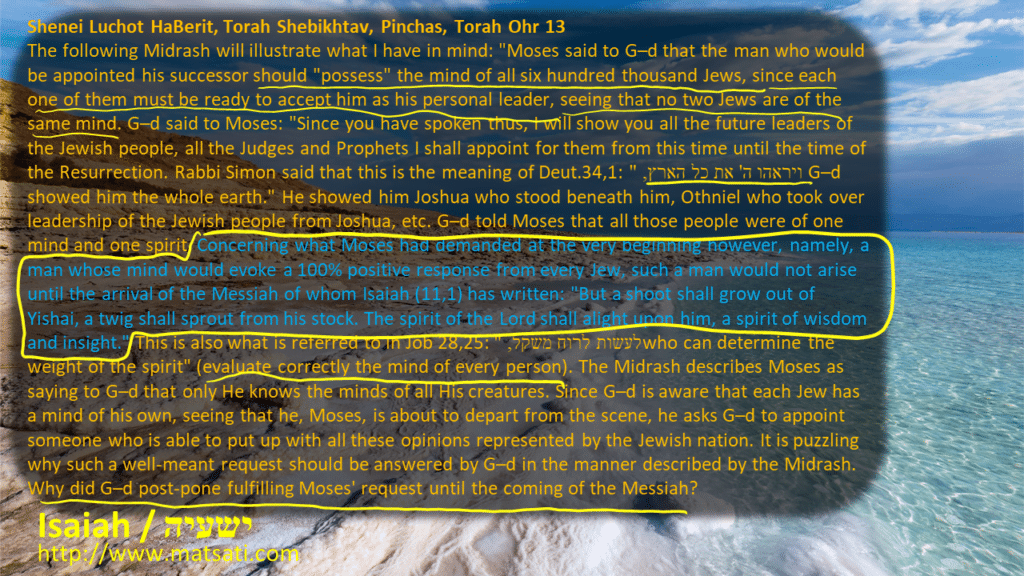
Shenei Luchot HaBerit, Torah Shebikhtav, Pinchas, Torah Ohr 13
The following Midrash will illustrate what I have in mind: “Moses said to G–d that the man who would be appointed his successor should “possess” the mind of all six hundred thousand Jews, since each one of them must be ready to accept him as his personal leader, seeing that no two Jews are of the same mind. G–d said to Moses: “Since you have spoken thus, I will show you all the future leaders of the Jewish people, all the Judges and Prophets I shall appoint for them from this time until the time of the Resurrection. Rabbi Simon said that this is the meaning of Deut.34,1: ויראהו ה’ את כל הארץ, “G–d showed him the whole earth.” He showed him Joshua who stood beneath him, Othniel who took over leadership of the Jewish people from Joshua, etc. G–d told Moses that all those people were of one mind and one spirit. Concerning what Moses had demanded at the very beginning however, namely, a man whose mind would evoke a 100% positive response from every Jew, such a man would not arise until the arrival of the Messiah of whom Isaiah (11,1) has written: “But a shoot shall grow out of Yishai, a twig shall sprout from his stock. The spirit of the Lord shall alight upon him, a spirit of wisdom and insight.” This is also what is referred to in Job 28,25: לעשות לרוח משקל, “who can determine the weight of the spirit” (evaluate correctly the mind of every person). The Midrash describes Moses as saying to G–d that only He knows the minds of all His creatures. Since G–d is aware that each Jew has a mind of his own, seeing that he, Moses, is about to depart from the scene, he asks G–d to appoint someone who is able to put up with all these opinions represented by the Jewish nation. It is puzzling why such a well-meant request should be answered by G–d in the manner described by the Midrash. Why did G–d post-pone fulfilling Moses’ request until the coming of the Messiah?
It is interesting how in Jewish thought the idea of the Messiah (the anointed one of God) will possess the mind of six hundred thousand Jews. The concept here is that these people will accept him as their personal leader. Note that these people are unique individuals, and each person must place their faith in him. In addition, he will be given knowledge of all the future leaders of Israel, from the time of Moshe until the time of the Resurrection. This is brought into context of all the world using the Torah text according to Devarim / Deuteronomy 34,1: ויראהו ה’ את כל הארץ “G–d showed him the whole earth.” These things are based upon Isaiah 11:1-2 “But a shoot shall grow out of Yishai, a twig shall sprout from his stock. The spirit of the Lord shall alight upon him, a spirit of wisdom and insight.” The Messianic figure will also be able to evaluate correctly the mind of every person, which is based upon Job 28:25: לעשות לרוח משקל, “who can determine the weight of the spirit.” We are told according to the Midrash that Moshe requested from the Lord to appoint someone who is able to deal with all of the individual opinions of the people in Israel. This was delayed until the coming of the Messiah. If we consider these things according to the Midrash, all of these things are consistent with the NT account of the life of Yeshua.
The Targum continues saying, ב וְתִשרֵי עְלֹוהִי רוּחַ מִן קֳדָם יוי רוּחַ חָכמָה וְסֻכלְתָנוּ רוּחַ מֵילַך וּגבוּרָא רוּחַ מַדַע וְדַחלְתָא דַיוי׃ 11:2 And there shall dwell upon Him the Spirit of prophecy from before the Lord: the Spirit of wisdom and understanding, the Spirit of counsel and might, the Spirit of knowledge and of the fear of the Lord. (TgJ) The phrase וְתִשרֵי עְלֹוהִי רוּחַ מִן קֳדָם יוי indicates that the spirit from before the Lord will dwell in him, the Messiah. We note what the prophet Zechariah states according to Zechariah 4:6 Then he answered and spake unto me, saying, This is the word of the LORD unto Zerubbabel, saying, Not by might, nor by power, but by my spirit, saith the LORD of hosts. (KJV) Job writes according to Job 33:4 saying, “The Spirit of God has made me, and the breath of the Almighty has given me life.” Midrash Rabbah Bereshit / Genesis 2 and Midrash Rabbah on Vayikra / Leviticus 14 state “From the time of creation constant reference is made to the Holy Writ to Messiah and the Messianic hope of Israel. The Spirit of God moved upon the face of the waters; the Spirit of God means Messiah.” We note that the Spirit of God functions as a creative activity in our lives, causing us to walk according to God’s holy ways, creating within us a new creation, we note what Paul writes, 2 Corinthians 5:17: “Therefore, if anyone is in Christ, he is a new creation; the old has gone, the new has come!” (NIV) The connection to this Spirit of God is made to the Messiah! We note how all of these things speak to the middot ha-lev (qualities of the heart) that distinguish the minim (believers), the ones who follow in the footsteps of Yeshua the Messiah. The Talmud Bavli Sanhedrin 93b states the following:
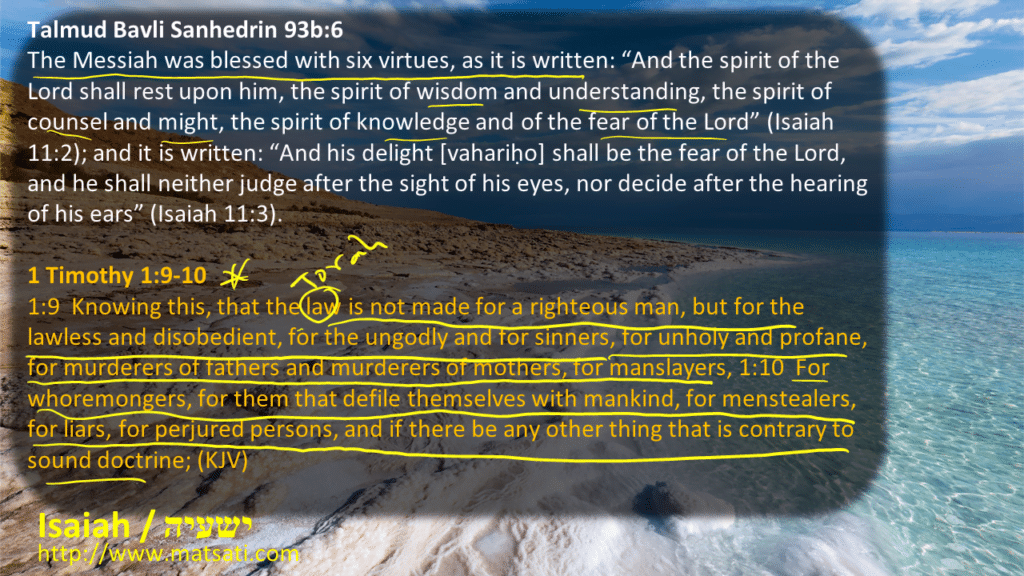
Talmud Bavli Sanhedrin 93b:6
The Messiah was blessed with six virtues, as it is written: “And the spirit of the Lord shall rest upon him, the spirit of wisdom and understanding, the spirit of counsel and might, the spirit of knowledge and of the fear of the Lord” (Isaiah 11:2); and it is written: “And his delight [vahariḥo] shall be the fear of the Lord, and he shall neither judge after the sight of his eyes, nor decide after the hearing of his ears” (Isaiah 11:3).
We note the rabbis discuss the idea that the Messiah was blessed with six virtues. It is interesting how the Messiah also gives these attributes to His people via the Holy Spirit of God dwelling in the believers. Paul wrote according to Galatians 5:22-23 saying “the fruit of the Spirit (פרי הרוח) is love, joy, peace, long-suffering, generosity, acts of kindness, faithfulness, humility, and modesty, against such there is no Torah.” We note that the Torah was given for the sinner, not for the righteous. The Spirit of God also gives His people the fear of the Lord and the ability to discern truth and lies. Against the one who walks according to the Spirit, this is the Spirit controlled life, the Torah has nothing to say. This means that one is not being judged by the Torah who walks in the Spirit. On the other hand, the one who walks according to the flesh, he is guilty before God because of the Torah command. Note this is how Paul writes that those who are in the Messiah are no longer “under the Law.” The sense is not that the Torah has passed away, but that the power of God is available in the lives of God’s people to overcome sin, and to be set free from the legal penalty as one walks according to the Spirit in the Messiah. This is what Paul says explicitly according to 1 Timothy 1:9-10.
1 Timothy 1:9-10
1:9 Knowing this, that the law is not made for a righteous man, but for the lawless and disobedient, for the ungodly and for sinners, for unholy and profane, for murderers of fathers and murderers of mothers, for manslayers, 1:10 For whoremongers, for them that defile themselves with mankind, for menstealers, for liars, for perjured persons, and if there be any other thing that is contrary to sound doctrine; (KJV)
The power of God in the Spirit that indwells the Messiah, he will function as the Targum describes saying, ג וִיקָרְבִיניֵה לְדַחלְתֵיה יוי וְלָא לְחֵיזוּ עֵינֹוהִי יְהֵי דָאֵין וְלָא לְמִשמַע אוּדנֹוהִי יְהֵי מֹוכַח׃ 11:3 He shall bring him to the fear of the Lord: and He shall not judge according to the sight of His eyes, neither reprove after the hearing of His ears. (TgJ) Rashi comments saying the following concerning this verse.
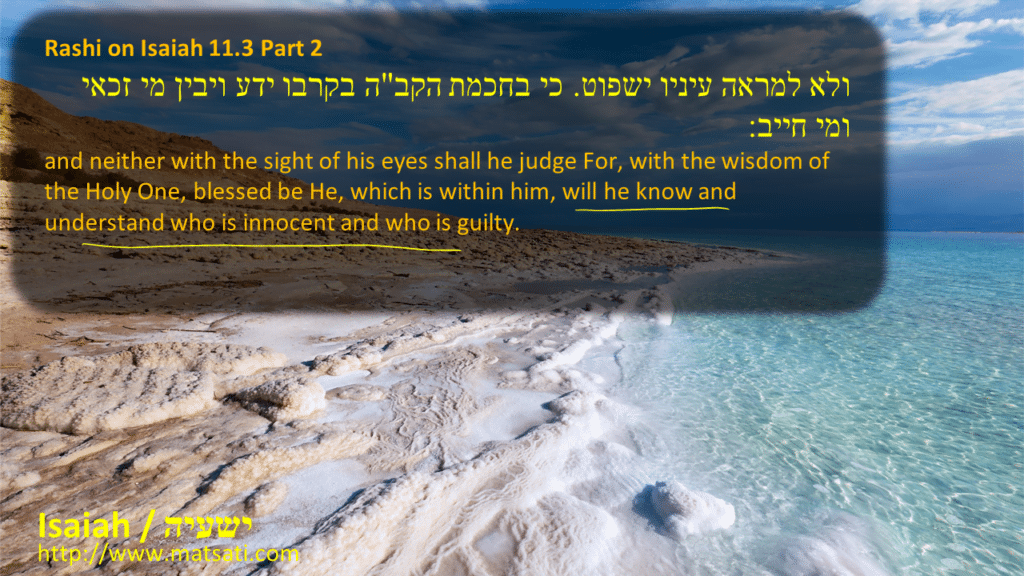
Rashi on Isaiah 11.3 Part 2
ולא למראה עיניו ישפוט. כי בחכמת הקב”ה בקרבו ידע ויבין מי זכאי ומי חייב:
and neither with the sight of his eyes shall he judge For, with the wisdom of the Holy One, blessed be He, which is within him, will he know and understand who is innocent and who is guilty.
The power of God within the Messiah will be to discern truth. These things are coupled to walking according to the Spirit of God. We note how significant these truths are, how the Isaiah text and the rabbis link the Messiah to the Spirit, and how we are to live our lives. We are called to trust in the Lord God Almighty, and have faith in His promised One, Yeshua the Messiah. The truth is even more relevant for our lives today! Jeremiah 17:5-10 and Galatians 6:7-8 state the following:
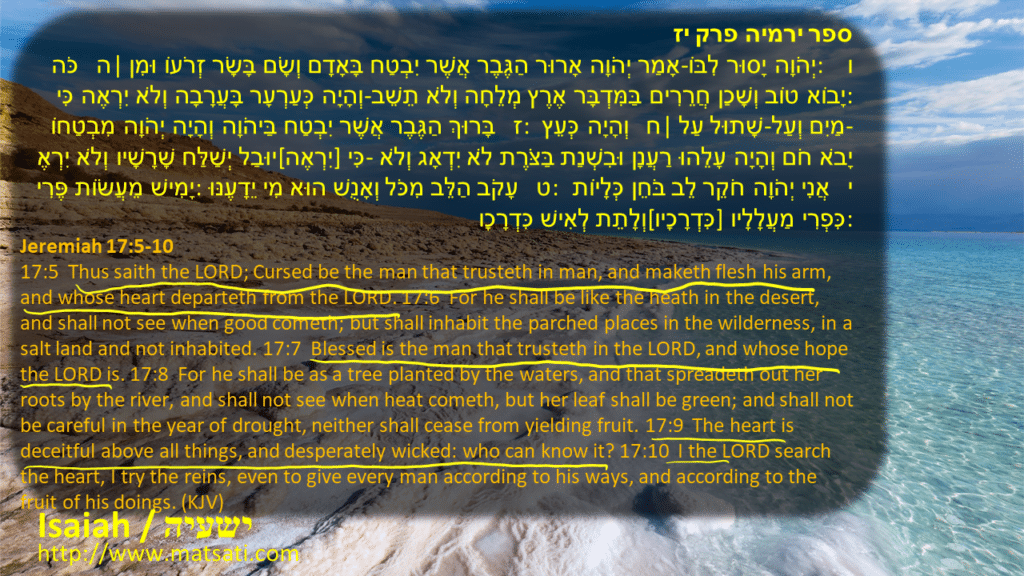
ספר ירמיה פרק יז
ה כֹּה | אָמַר יְהֹוָה אָרוּר הַגֶּבֶר אֲשֶׁר יִבְטַח בָּאָדָם וְשָֹם בָּשָֹר זְרֹעוֹ וּמִן-יְהֹוָה יָסוּר לִבּוֹ: ו וְהָיָה כְּעַרְעָר בָּעֲרָבָה וְלֹא יִרְאֶה כִּי-יָבוֹא טוֹב וְשָׁכַן חֲרֵרִים בַּמִּדְבָּר אֶרֶץ מְלֵחָה וְלֹא תֵשֵׁב: ז בָּרוּךְ הַגֶּבֶר אֲשֶׁר יִבְטַח בַּיהֹוָה וְהָיָה יְהֹוָה מִבְטַחוֹ: ח וְהָיָה כְּעֵץ | שָׁתוּל עַל-מַיִם וְעַל-יוּבַל יְשַׁלַּח שָׁרָשָׁיו וְלֹא יִרְאֶ [יִרְאֶה] כִּי-יָבֹא חֹם וְהָיָה עָלֵהוּ רַעֲנָן וּבִשְׁנַת בַּצֹּרֶת לֹא יִדְאָג וְלֹא יָמִישׁ מֵעֲשֹוֹת פֶּרִי: ט עָקֹב הַלֵּב מִכֹּל וְאָנֻשׁ הוּא מִי יֵדָעֶנּוּ: י אֲנִי יְהֹוָה חֹקֵר לֵב בֹּחֵן כְּלָיוֹת וְלָתֵת לְאִישׁ כִּדְרָכָו [כִּדְרָכָיו] כִּפְרִי מַעֲלָלָיו:
Jeremiah 17:5-10
17:5 Thus saith the LORD; Cursed be the man that trusteth in man, and maketh flesh his arm, and whose heart departeth from the LORD. 17:6 For he shall be like the heath in the desert, and shall not see when good cometh; but shall inhabit the parched places in the wilderness, in a salt land and not inhabited. 17:7 Blessed is the man that trusteth in the LORD, and whose hope the LORD is. 17:8 For he shall be as a tree planted by the waters, and that spreadeth out her roots by the river, and shall not see when heat cometh, but her leaf shall be green; and shall not be careful in the year of drought, neither shall cease from yielding fruit. 17:9 The heart is deceitful above all things, and desperately wicked: who can know it? 17:10 I the LORD search the heart, I try the reins, even to give every man according to his ways, and according to the fruit of his doings. (KJV)
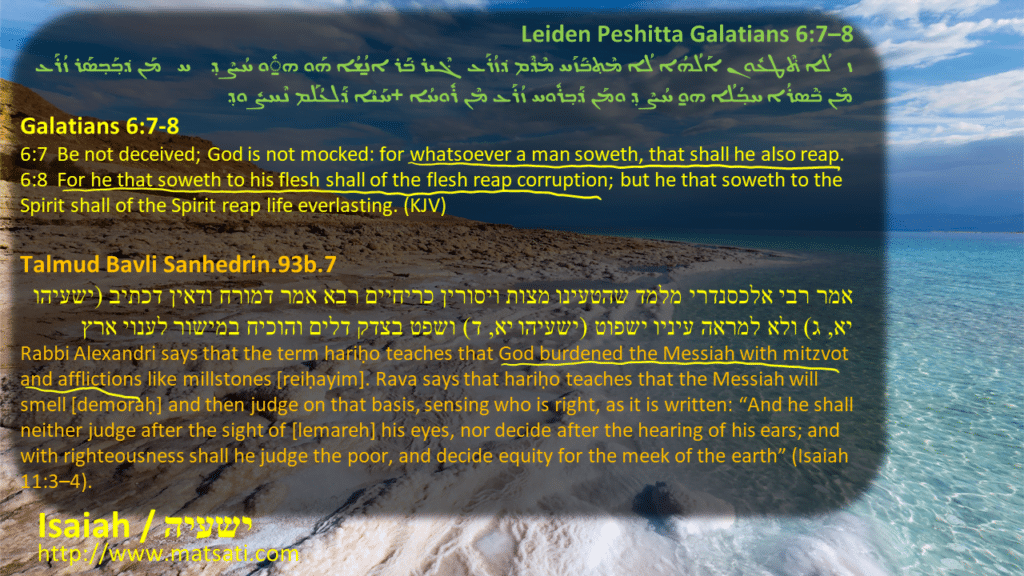
Leiden Peshitta Galatians 6:7–8
ܙ ܠܳܐ ܬ݁ܶܛܥܽܘܢ ܐܰܠܳܗܳܐ ܠܳܐ ܡܶܬ݂ܒ݁ܰܙܰܚ ܡܶܕ݁ܶܡ ܕ݁ܙܳܪܰܥ ܓ݁ܶܝܪ ܒ݁ܰܪ ܐ̱ܢܳܫܳܐ ܗܰܘ ܗ̱ܽܘ ܚܳܨܶܕ݂ ܚ ܡܰܢ ܕ݁ܒ݂ܰܒ݂ܣܰܪ ܙܳܪܰܥ ܡܶܢ ܒ݁ܶܣܪܳܐ ܚܒ݂ܳܠܳܐ ܗ̱ܘ ܚܳܨܶܕ݂ ܘܡܰܢ ܕ݁ܰܒ݂ܪܽܘܚ ܙܳܪܰܥ ܡܶܢ ܪܽܘܚܳܐ +ܚܰܝܶܐ ܕ݁ܰܠܥܳܠܰܡ ܢܶܚܨܽܘܕ݂
Galatians 6:7-8
6:7 Be not deceived; God is not mocked: for whatsoever a man soweth, that shall he also reap. 6:8 For he that soweth to his flesh shall of the flesh reap corruption; but he that soweth to the Spirit shall of the Spirit reap life everlasting. (KJV)
Note what is happening today. People on a massive scale are trusting in man and in the flesh as opposed to trusting in God. The one who does this calls a curse down upon themselves and they will reap the consequences. Just as Paul wrote, if a person slows to the flesh he will reap corruption, and if one sows according to the spirit he will reap life everlasting. This is absolutely true, look at what is taking place today, those who trust in man and putting their trust in the flesh are reaping the consequences. What we see going on today, death, vax injuries which include but not limited to, miocarditis, neurological damage, and cancer. We note that the data on these show >300% increases in these from starting in 2021 compared to the 5 year average prior. The words of the Scriptures are timeless and God’s Word is absolutely true! If one sews to the flesh, expect to receive corruption, death, and injury!
Isaiah continues according to the Targum saying, ד וִידִין בְקוּשטָא מִסכֵינִין וְיֹוכַח בְהֵימָנוּתָא לְחַשִיכֵי עַמָא דארעא וְיִמחֵי חַייָבֵי אַרעָא בְמֵימַר פוּמֵיה וּבמַמלַל סִפוָתֵיה יְהֵי מָאִית רַשִיעָא׃ 11:4 But with righteousness shall He judge the poor, and reprove with faithfulness the needy of the earth; and He shall smite the sinners of the earth with the word of His mouth, and with the speech of His lips He shall slay the wicked. (TgJ)
Talmud Bavli Sanhedrin.93b.7
אמר רבי אלכסנדרי מלמד שהטעינו מצות ויסורין כריחיים רבא אמר דמורח ודאין דכתיב (ישעיהו יא, ג) ולא למראה עיניו ישפוט (ישעיהו יא, ד) ושפט בצדק דלים והוכיח במישור לענוי ארץ
Rabbi Alexandri says that the term hariḥo teaches that God burdened the Messiah with mitzvot and afflictions like millstones [reiḥayim]. Rava says that hariḥo teaches that the Messiah will smell [demoraḥ] and then judge on that basis, sensing who is right, as it is written: “And he shall neither judge after the sight of [lemareh] his eyes, nor decide after the hearing of his ears; and with righteousness shall he judge the poor, and decide equity for the meek of the earth” (Isaiah 11:3–4).
Note the Talmud speaks of the messiah being burdened with mitzvot and afflictions. In Jewish thought we read that “…the Messiah is Israel’s guarantor; he has undertaken suffering to atone for Israel’s sins in order to shorten the exile (Yalkut Shimoni 499).” According to Rambam, the Messianic Age will be a time when we will have the opportunity to fulfill all 613 Mitzvot (see Acts 21:17-20 specifically verse 20). Our entire lives will revolve around the study and performance of the Torah (The Teachings/God’s instruction) and Mitzvot (The Laws), and the knowledge of God will spread throughout the world. (Jeremiah 31:33-34) Note the parallels to the NT descriptions of Yeshua. The empowering of our lives to overcome sin by the indwelling of the Holy Spirit, which is synonymous to walking according to the Spirit, another way of saying this is “keeping the mitzvot (commandments).” Another way of saying it, “our entire lives will revolve around the study and performance of the Torah i.e.applying God’s word to our lives.” The TgJ put this into context saying, ה וִיהֹון צַדִיקַיָא סְחֹור סְחֹור לֵיה וְעָבְדֵי הֵימָנוּתָא מְקָרְבִין לֵיה׃ 11:5 And the righteous shall be round about Him, and those that work in faith shall draw nigh unto Him. (TgJ) This is exactly the type of relationship we will have with the Messiah according to the NT descriptions of Yeshua. We note the kind of relationship that Yeshua describes according to John 15:1-11.
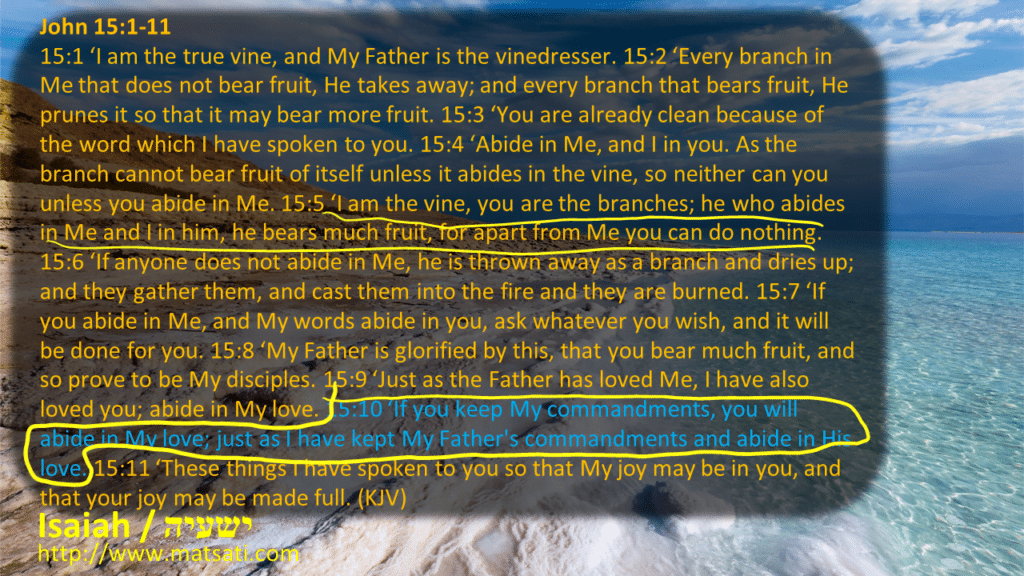
John 15:1-11
15:1 ‘I am the true vine, and My Father is the vinedresser. 15:2 ‘Every branch in Me that does not bear fruit, He takes away; and every branch that bears fruit, He prunes it so that it may bear more fruit. 15:3 ‘You are already clean because of the word which I have spoken to you. 15:4 ‘Abide in Me, and I in you. As the branch cannot bear fruit of itself unless it abides in the vine, so neither can you unless you abide in Me. 15:5 ‘I am the vine, you are the branches; he who abides in Me and I in him, he bears much fruit, for apart from Me you can do nothing. 15:6 ‘If anyone does not abide in Me, he is thrown away as a branch and dries up; and they gather them, and cast them into the fire and they are burned. 15:7 ‘If you abide in Me, and My words abide in you, ask whatever you wish, and it will be done for you. 15:8 ‘My Father is glorified by this, that you bear much fruit, and so prove to be My disciples. 15:9 ‘Just as the Father has loved Me, I have also loved you; abide in My love. 15:10 ‘If you keep My commandments, you will abide in My love; just as I have kept My Father’s commandments and abide in His love. 15:11 ‘These things I have spoken to you so that My joy may be in you, and that your joy may be made full. (KJV)
The NT text contains many such comments from Yeshua and the disciples. As Yeshua’s disciples we draw our strength from the Messiah in our lives. The vine, the branch, and the fruit analogy all demonstrate these things. Abiding in the Messiah is synonymous to keeping God’s Word, making God’s word are part of our lives, applying God’s Word to our lives, and seeking God’s help to overcome the world just as Yeshua did by the power of His indwelling Spirit. (see John 14) The power of the reign of the Messiah in our lives is what Isaiah is speaking of when he continues in Isaiah 11:6-9 according to the TgJ. ו בְיֹומֹוהִי דִמשִיחָא דְיִשׂרָאֵל יִסגֵי שְלָמָא בְאַרעָא וִידוּר דֵיבָא עִם אִימְרָא וְנִמרָא עִם גַדיָא יִשרֵי וְעֵגַל וְאַריָא וּפַטִים כַחדָא וְיָניִק זְעיֵר מְדַבַר לְהֹון׃ 11:6 In the days of the Messiah of Israel peace shall be multiplied in the earth. The wolf shall dwell with the lamb, and the leopard shall dwell with the kid; and the calf, and the lion, and the fatling together; and a little sucking child shall be leading them. ז וְתֹורְתָא וְדוּבָא יִרעְיָן כַחדָא יִשרֹון בְנֵיהֹון וְאַריָא כְתֹורָא יֵיכֹול תִבנָא׃ 11:7 And the cow and the bear shall feed together, their young ones shall lie down together; and the lion shall eat straw like the ox. ח וִיחָיֵיך יָנְקָא עַל חוּר חִיוֵי פְתַן וְעַל חֵיזוּ גִלגְלֵי עֵינֵי חִוֵי חֻרמָן חְסִילָא יְדֹוהִי יֹושִיט׃ 11:8 And the sucking child shall play on the hole of the asp, and the weaned child shall put forth his hand on the glistering pupil of the eyes of the cockatrice. ט לָא יַבאְשוּן וְלָא יְחַבְלוּן בְכָל טוּרָא דְקוּדשִי אְרֵי תִתמְלֵי אַרעָא מַדַע יָת דַחלְתָא דַיוי כְמַיָא דִליַמָא חָפַן׃ 11:9 They shall not hurt nor destroy in all my holy mountain, for the earth shall be full of the knowledge of the fear of the Lord, as the waters cover the sea. (TgJ) These things describe the inner peace that the Messiah gives to His people, something that changes the very nature of the beasts of the field. The Messiah will give us mussar, through the Holy Spirit which will set us in the path of spiritual development that leads to awareness, wisdom, and transformation. The Holy Spirit through the Word of God will teach us as individuals to understand our created nature, to be holy, and righteous, and it is the Lord God Almighty who literally helps us to break through the barriers that surround and obstruct holiness in our lives. It is God’s Holy Spirit that dwells within that helps people overcome the obstacles that hinder them from obeying the mitzvot (commandments), another way of saying it, “of walking according to the Spirit.” Remember in the past we have discussed the topic of how man was created, basar (flesh) → nefesh (soul) → neshamah (spirit). The flesh is what guides us as children, to partake in the fleshly desires. The nefesh is the seat of all our emotions and appetites, the realm of personality and identity. The neshamah is our spiritual connection to the Creator, to our Father in heaven. The nefesh and neshamah are the dwelling place of God’s Holy Spirit within, in which the Lord is working to transform us. Note that the soul is what connects us to this world: our personality, character, appetites, aversions, strengths and weaknesses, these things are how the world recognizes us as these lead to our actions in life. Note that these are the things the Lord works in our lives to transform us so that the light of God’s glory may shine forth. All of these Jewish concepts draw out our understanding of the Messiah, and His work in our lives through faith. The power of God in our lives literally makes peace in our hearts, such that we pray even for our enemies. This is to the glory of God, by faith in the Messiah Yeshua, and the presence of God in our lives, a Torah Centric Principle!
